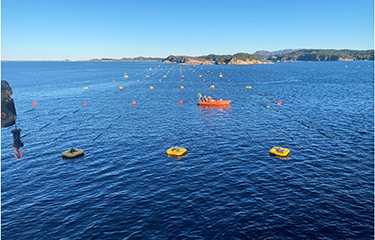SeafoodSource is closely following seaweed innovation by compiling a regular round-up of updates from the sector.
- The Philippine Chamber of Agriculture and Food Inc (PCAFI) has requested PHP 250 million (USD 4.5 million, EUR 4.1 million) to boost the country's seaweed industry.
PCAGI President Danilo Fausto said the request for an increased budget was in line with the upcoming review of carrageenan as a viable ingredient for U.S. organic products, according to The Manila Times.
Sales of Filipino carageenan, a thickening agent derived from seaweed, amounted to USD 40 million (EUR 37 million) in the U.S. and USD 75 million (EUR 69.5 million) in the E.U. in 2022, according to Fausto.
"Delisting of carrageenan would imperil Philippines' market share in the USA and [have a] potential adverse effect in the European market due to disinformation about carrageenan safety," Fausto said.
- Flekkefjord, Norway-based Arctic Seaweed announced it concluded its seaweed deployment season at its in-house farms and its SaaS partner farms in Greenland and Alesund, Norway.
The company said it was a “year of breaking records” on account of its high scaling volumes through technology optimization.
“Stats for the deployment of 1 Arctic Seaweed cultivation module (containing up to 25 kilometers of seeded lines). Fastest Deployment Time: 2 hours (10-hour work day equals 5 modules equals up to 80 kilometers). Average Deployment Time (across three farming locations: 3 hours. (10 hour work day equals 3.5 modules equals up to 50 kilometers,” the company wrote on its LinkedIn.
- Hong Kong, China-based biotech company AIGreen announced a new microalgae solution that can be used to capture carbon at scale.
The new miniature capture system, "liquid plant," is capable of absorbing 6.3 grams of carbon dioxide weekly, according to the South China Morning Post.
“We have worked hard to design and manufacture scalable products from our laboratory in Hong Kong Science Park,” AI Green CTO and Co-Founder Rehaan Lulla said. “Now we’re looking at what we can do with the algae itself, and how we can use algae to make commercial products.”
The startup has teased a commercial-scale launch of its system in 2024.
“We’re trying to commercialize certain products, such as our ‘liquid plant,’” Lulla said. “Instead of leaves and a stem, it’s just cells growing in water. It can make for a nice decorative piece, while also absorbing carbon dioxide in an office or at home.”
Photo courtesy of Arctic Seaweed







